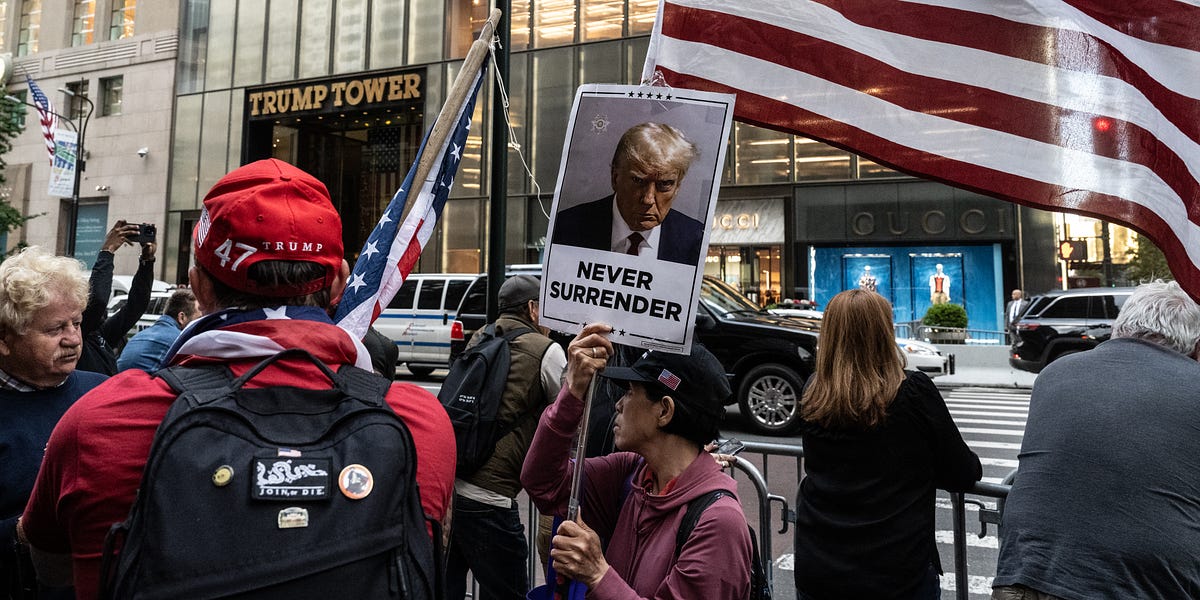Trump Is a Convicted Felon. But the American People Are Still the American People.

🌈 Abstract
The article discusses the conviction of former President Donald Trump on 34 felony counts, the implications of this for American politics, and the author's perspective on the state of the American electorate.
🙋 Q&A
[01] Good News / Bad News
1. What are the key points made in the "Good News / Bad News" section?
- The good news is that the rule of law can still function, as the trial was orderly, the state's case was strong, and the defense was vigorous and professional.
- Trump has been held accountable for his actions by the criminal justice system, which is an important event.
- The bad news is that a significant portion of the American electorate still holds views that are disconnected from reality, and a felony conviction is unlikely to substantially change their support for Trump.
- The author believes the state of the American voter is such that a felony conviction is unlikely to move the polls even by 5 percentage points.
2. Why does the author believe a felony conviction is unlikely to significantly impact Trump's support?
- The author argues that a significant portion of the American electorate holds views that are disconnected from reality, such as believing the economy is shrinking and unemployment is at a 50-year high when the opposite is true.
- The author believes these voters are willing to "play make-believe with political life" and are unlikely to be swayed by Trump's felony conviction, just as they were not swayed by his past controversial actions.
3. What is the author's view on the "both sides" argument regarding Trump's conviction?
- The author rejects the "both sides" argument, stating that they "don't do 'BOtH sIDeS' around here."
- The author argues that the only relevant question is whether Trump is guilty, and if the answer is yes, then the "both sides" argument is just "posturing and special pleading."
[02] Speaking of Both Sides
1. What is the author's critique of Peggy Noonan's column?
- The author argues that Noonan's column is an exercise in "both sidesism," pretending that the real Democratic party is some "student radical" who hates Biden's policies, rather than acknowledging the bipartisan efforts led by Biden.
- The author provides an example of Biden reaching out to Republicans in a bipartisan manner, which the author argues is exactly the type of respectful engagement Noonan claims is lacking.
- The author questions Noonan's characterization of Kamala Harris as "wholly unsuited" and "wholly unserious" for the presidency, arguing that Noonan should provide specific evidence to support these claims.
2. What is the author's suggestion for how to "turn things around"?
- The author suggests that people like Peggy Noonan should stop pretending that the problem is "both sides" and instead support publications that "don't play make believe," such as The Bulwark.
[03] It's Always the Ones You'd Most Expect
1. What is the connection made between the neo-Nazi group and the 2017 Charlottesville rally?
- The article states that the neo-Nazi group member, Stephen Farrea, was radicalized after the Charlottesville rally, which the author argues was made possible because the participants believed that the election of Donald Trump meant their cause was on the rise.
- The author suggests that Trump's election sent "ripples" that led white nationalists to believe they had an ally in the White House, which contributed to events like the Charlottesville rally.
Shared by Daniel Chen ·
© 2024 NewMotor Inc.